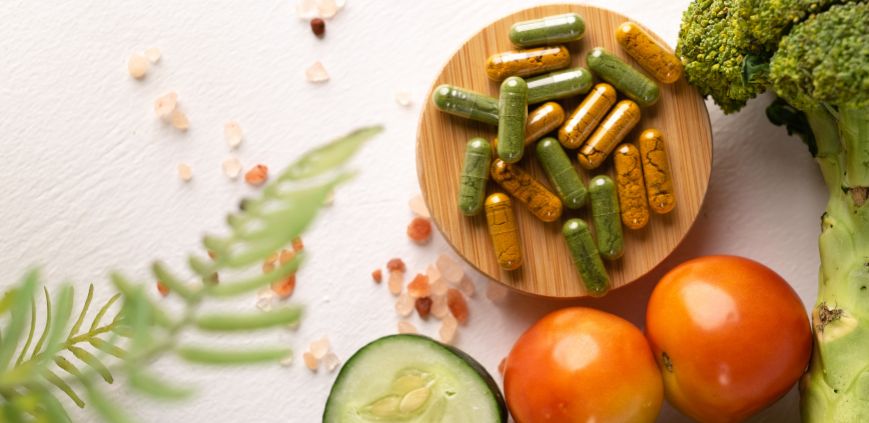A Healthy Gut Starts with Your Diet
Did you know your gut health affects not only digestion but also mental clarity, skin health and disease resistance? When it's out of balance, the effects ripple throughout your entire body, manifesting as fatigue, mood swings, digestive discomfort and weakened immunity. The right combination of targeted supplements and nutrient-dense foods can restore balance to your gut, so let's take a look at how to boost gut health.
Supplements for Gut Restoration
Emma
Emma stands as a game-changing supplement in the realm of digestive health, specifically engineered to address the complex challenges of modern gut dysfunction. This sophisticated formula tackles one of the most overlooked aspects of digestive distress: excessive gas production by harmful bacteria that leads to chronic bloating and irregular bowel movements.
Users frequently experience remarkable improvements in digestive comfort, with many reporting reduced bloating, more regular elimination and increased energy levels. The formula works by addressing multiple digestive challenges simultaneously rather than focusing on isolated symptoms, making it particularly effective for individuals with complex gut issues.
Probiotic Supplements
Modern probiotic science has revealed that diversity trumps quantity when it comes to beneficial bacteria. The most effective probiotic supplements contain carefully selected strains that have been clinically studied for specific health benefits. Soil-based organisms like bacillus coagulans and bacillus subtilis offer superior survival rates and colonization potential compared to traditional dairy-based strains.
These hardy microorganisms can withstand stomach acid and bile salts, arriving intact in the intestines where they establish beneficial colonies. Research indicates that rotating between different probiotic formulas prevents bacterial monotony and promotes greater microbial diversity.
Plant-Based Digestive Enzymes
Comprehensive enzyme supplementation becomes essential when production diminishes due to age, stress or poor dietary habits. Plant-derived enzymes like bromelain from pineapple and papain from papaya offer gentle yet effective protein digestion support without the harsh effects sometimes associated with animal-derived enzymes.
Full-spectrum enzyme blends that include cellulase for fiber breakdown, lactase for dairy digestion and alpha-galactosidase for complex carbohydrates can eliminate common food sensitivities and improve overall digestive efficiency.
Related Search Topics (Ads)
Therapeutic Foods for Digestive Healing
Cultured Vegetable Varieties
Naturally fermented vegetables provide unique bacterial strains not found in commercial probiotics. These traditional foods undergo wild fermentation, creating complex microbial communities that enhance digestive diversity.
Water kefir grains produce a light, fizzy beverage containing beneficial yeasts and bacteria that support both small and large intestine health. Unlike dairy kefir, water kefir is suitable for those avoiding animal products while still providing robust probiotic benefits.
Plant Foods
Aloe vera leaf gel contains polysaccharides that soothe irritated intestinal tissue while providing prebiotic support.
Chia seeds soaked in water create a gel-like consistency that coats and protects the digestive tract while delivering omega-3 fatty acids and soluble fiber.
Slippery elm bark powder mixed into smoothies provides demulcent properties that help heal inflamed mucous membranes throughout the digestive system.
Mushrooms
Shiitake and reishi mushrooms contain beta-glucans that support immune function while promoting beneficial bacterial growth. These fungi also provide unique prebiotic fibers that feed specific bacterial strains involved in immune regulation.
Turkey tail mushroom extract has been shown to increase microbial diversity and support the growth of beneficial bacteria like bifidobacterium and lactobacillus.
Anti-inflammatory Spices and Herbs
Fresh ginger root contains gingerols that stimulate digestive juices while reducing nausea and bloating. Regular consumption of ginger tea can improve gastric emptying and reduce inflammation throughout the digestive tract.
Ceylon cinnamon provides antimicrobial benefits against harmful bacteria and yeast while supporting healthy blood sugar levels that influence gut bacteria composition. Unlike cassia cinnamon, Ceylon variety contains minimal coumarin, making it safe for daily consumption.
Fennel seeds chewed after meals provide carminative effects that reduce gas and bloating while supplying prebiotic compounds that support beneficial bacteria growth.
Mineral-rich Bone Broth
Slow-simmered bone broths from grass-fed animals provide collagen, glycine and proline that support intestinal lining repair. Adding apple cider vinegar to the cooking process extracts additional minerals from bones while creating an acidic environment that enhances nutrient absorption.
Vegetarian alternatives using kombu seaweed and shiitake mushrooms create mineral-rich broths that provide umami flavor while supporting digestive health through natural glutamates and trace minerals.
Implementation Strategies for Lasting Results
Successful gut healing requires a systematic approach that introduces changes gradually to avoid overwhelming your system. Begin with gentle interventions like bone broth and fermented vegetables before adding stronger supplements like Emma or high-dose probiotics.
Meal timing significantly impacts digestive health, with longer periods between eating allowing beneficial bacteria to process fiber and produce healing compounds. Consider incorporating intermittent fasting or extending the overnight fast to give your digestive system adequate rest.
Environmental factors like chronic stress, inadequate sleep and exposure to toxins can undermine even the best supplementation and dietary efforts. Incorporating stress-reduction techniques, prioritizing sleep quality and minimizing exposure to antibacterial products creates a more supportive environment for gut healing.

